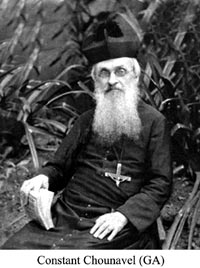- In the Jaffna vicariate from 1852 to 1893
- In the vicariate of Colombo from 1883 to 1923
- Talents and virtues
Born: Socourt (Vosges), France, April 9, 1825
Took the habit: Nancy, January 15, 1849 (No.272)
Vows: Marseilles, February 17, 1850.
Priestly ordination: Marseilles, February 15, 1842
Died: Borella, August 23, 1923.
Constant Chounavel was born in Socourt, diocese of Saint-Dié, France, on April 9, 1825. His parents were Joseph Chounavel and Christine Pierron. He frequented the local school in Socourt before going to Châtel-sur-Moselle and, from 1847 to 1949, the major seminary of Saint-Dié. On January 15, 1849 he entered the Oblate novitiate in Nancy where Father Eugène Dorey was novice master. He completed his novitiate at the major seminary in Marseilles and there he took vows on February 17, 1850, and continued his philosophical and theological studies. According to his own manu memoirs, he became resigned “to being the last in his course” because of his shyness and lack of self-confidence. Bishop de Mazenod, in a letter to Father Étienne Semeria, dated January 21, 1852, informed him that he was sending him three missionaries. He described Father Chounavel in these words: “The third man is also excellent although less brilliant”. He ordained him to the priesthood on February 15, 1852, and immediately gave him an obedience for Ceylon.
In the Jaffna vicariate from 1852 to 1893
Father Chounavel left for Ceylon in the company of Father Jean Pélissier, on April 24 and arrived on September 26. For more than thirty years he ministered in the vicariate of Jaffna as pastor and missionary. The following is the list of his obediences: Jaffna, October 1852 to May 1853, Batticaloa, May 1853 to November 1855, Mantotte, November 1855 to May 1856, Trincomalee, May 1856 to May 1857, visitor in the forest of Vanni, in the north of the island, May 1857 to September 1857, preacher of parish missions with Bishop Semeria and Father Christopher Bonjean, September 1857 to November 1861, Wennappuwa, November 1861 to January 1863, Chilaw, January 1863 to October 1866, pastor in the cathedral of Jaffna, November 1869 to May 1872, ministry among the Buddhists in Talampitiya, January 1877 to August 1879, Wennappuwa, August 1879 to August 1883.
In the vicariate of Colombo from 1883 to 1923
In 1883 Bishop Bonjean was appointed vicar apostolic of Colombo and he brought Father Chounavel with him. There again the latter ministered in several missions: Kotahena, from August 1883 to January 1884, Bolawatta, from January to September 1884. He was appointed vicar general on August 9, 1886 and then he was pastor of the cathedral in Kotahena from November 1886 to April 1889, Negombo (Sea Street), from April 1889 to July 1882, Negombo (Grand Street), from July 1892 to March 1893, Maggona, from September to November 1893, Borella, from November 1893 to February 1895, Kotahena, from November 1895 to November 1907, Kurunegala, from November 1907 to June 1909, Wennappuwa, from August 1910 to February 1917, Borella, from February 1917 to August 1923.
Talents and virtues
Father Chounavel did much writing, especially in Singhalese. Father Bernad, in his book, Bibliographie des Missionnaires Oblats de M.I., lists 35 books by Father Chounavel, published, for the most part, by the Catholic Press in Colombo. They are mainly translations and adaptations of works on spirituality and piety.
Wherever he went, and he ministered in practically all the Oblate missions in the vicariates of Jaffna and Colombo, he was a zealous apostle and an obedient religious who lived in poverty and prayer. This is how Father Charles Collin described the principal traits of his personality: “Father Chounavel was a good and holy religious, the perfect observer of the Rule and he knew how to combine austerity of life, work and monastic regularity with the candour, the simplicity and the playfulness of a child.” The author of his necrological note gave it the title “the saint” and he wrote: “God lavished special favours on Father Chounavel and for them he never ceased to give thanks: a long life for which he could see no end and extraordinarily good health. He had a stomach which could digest anything, except crayfish, and which never gave him any trouble after meals. Rheumatism had no access to his bones. He neither spat nor used a handkerchief and he did not perspire because he always moved slowly; he complained of being as dry as cork. In spite of the fact that he did not spare his eyes, often burying himself at night in his books and hieroglyphic manus, he was able to read at the age of 97. For a long time he was deaf in one ear, but the other one was always available. When we think about his self-denial, his tiring journeys, his dedication in all circumstances, we cannot help marvelling at his vigorous temperament …”
Little by little he became detached from everything. Age forced him eventually to preach and hear confessions less often. Because his hands trembled he could no longer distribute communion and had to have his meals in his room. As the light faded from his eyes he distributed his books, gave his manus to the superior, ceased to recite the breviary and celebrated only the Mass of the Blessed Virgin. All that remained to him at the end were his Oblate cross and his rosary beads, which he passed through his fingers day and night. Death came softly, slowly. He died in Borella on August 23, 1923, having lived to be almost one hundred. On the previous day he had received the sacrament of the sick while fully conscious. His body was laid to rest in the church in Wennappuwa.
Yvon Beaudoin, o.m.i.

